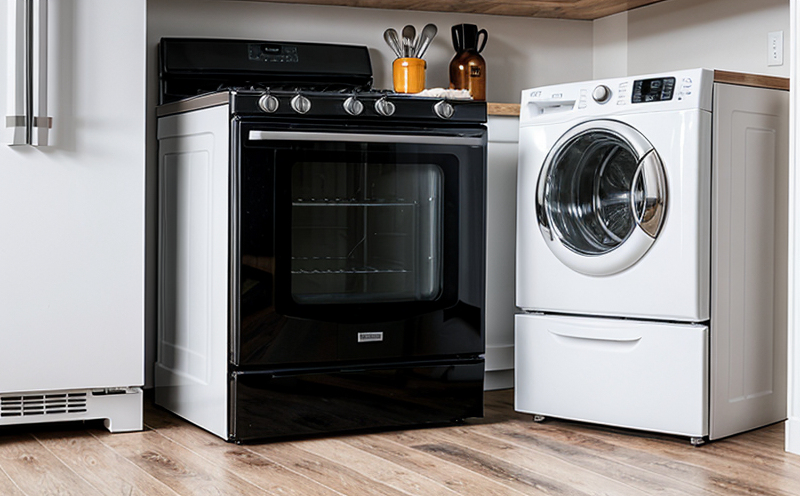Washing Machine Cleaning Performance Testing
The washing machine cleaning performance testing is a critical process in ensuring that products meet strict quality and safety standards. This service evaluates how effectively a washing machine removes soil, stains, and bacteria from textiles during the wash cycle. It encompasses a series of tests designed to simulate real-world usage conditions, thereby providing manufacturers with essential data on their machines' performance.
Consumer expectations are high; they demand appliances that not only clean efficiently but also do so safely and reliably over time. The testing process involves a variety of methodologies aimed at replicating the different types of dirt found in household washing. This includes organic soils such as grass, mud, and food stains, as well as synthetic contaminants like ink or marker marks.
The tests are conducted on a range of fabric types to ensure broad applicability across various consumer products. These fabrics can vary widely in texture and absorbency, which influences the cleaning performance significantly. By using these diverse materials, we can assess how effectively the washing machine tackles different challenges that users may face at home.
Instrumentation plays a crucial role in this testing process. Automated washers are used to simulate user behavior as closely as possible. Parameters such as water temperature, detergent usage, and cycle duration are meticulously controlled to reflect real-life scenarios accurately. The results obtained from these tests provide insights into the machine's performance under various conditions.
One of the key aspects of this service is understanding the specific requirements set by international standards like ISO 15729:2018, which provides guidelines for testing household washing machines. Compliance with such standards ensures that products meet global market demands and maintain consistency across different regions.
The testing process also involves analyzing the post-wash residues left on fabrics. This helps in determining whether the machine has effectively cleaned the textiles without leaving behind any harmful residues that could cause skin irritation or other issues for users. Additionally, the efficiency of fabric care programs is evaluated by assessing factors such as colorfastness and fabric integrity.
Another important consideration during this testing process is the potential impact on the environment. Sustainable practices are increasingly becoming a priority in product development, especially within the consumer goods industry. Therefore, it's essential to evaluate not only the cleaning performance but also the energy consumption and water usage of washing machines.
To summarize, washing machine cleaning performance testing involves rigorous evaluation using realistic conditions that mimic actual user experiences. This comprehensive approach ensures that manufacturers can optimize their products' efficiency while maintaining high standards of hygiene and safety.
Why It Matters
The importance of washing machine cleaning performance testing cannot be overstated, as it directly impacts consumer satisfaction and trust in the product's effectiveness. A well-executed test ensures that the washing machine can effectively remove dirt, stains, and bacteria from textiles without causing damage or leaving behind harmful residues.
- Consumer Satisfaction: Effective cleaning leads to higher customer satisfaction, as consumers expect their appliances to perform optimally every time they use them. Poor performance could lead to dissatisfaction and loss of brand loyalty.
- Brand Reputation: Consistent high-quality results enhance the reputation of both the manufacturer and the product line. This is crucial in building a strong market presence and fostering long-term customer relationships.
- Regulatory Compliance: Adhering to international standards like ISO 15729:2018 ensures compliance with legal requirements, avoiding potential penalties or recalls due to non-compliance.
- Sustainability: Evaluating the environmental impact of washing machines helps in making more sustainable choices, which is increasingly important for both businesses and consumers alike.
In conclusion, thorough testing not only meets regulatory standards but also supports brand reputation and consumer trust. It ensures that products meet or exceed expectations, leading to increased customer satisfaction and loyalty.
Eurolab Advantages
Eurolab offers unparalleled expertise in washing machine cleaning performance testing, providing a comprehensive range of services tailored to the unique needs of our clients. Our team comprises highly skilled professionals with extensive experience in this field, ensuring accurate and reliable test results.
- State-of-the-Art Facilities: Equipped with advanced instrumentation and equipment that meet international standards, our labs offer a controlled environment for precise testing.
- Comprehensive Testing Capabilities: We cover all aspects of washing machine cleaning performance, from basic dirt removal to more complex synthetic contaminant challenges.
- Expertise in Regulatory Compliance: Our team is well-versed in international standards like ISO 15729:2018, ensuring that clients' products are fully compliant with global regulations.
- Dedicated Client Support: From initial consultation to final report delivery, our dedicated team provides support throughout the testing process, offering guidance and assistance as needed.
In addition to these advantages, Eurolab's reputation for excellence in product safety and quality ensures that clients receive accurate and actionable insights into their products' performance. This commitment to precision and reliability has earned us a strong position in the industry, making us a trusted partner for any company seeking to improve its washing machine cleaning performance.
International Acceptance and Recognition
The testing of washing machines is internationally recognized as an essential part of ensuring product quality and safety. Various countries have their own standards and requirements, but adherence to international standards like ISO 15729:2018 provides a common benchmark for acceptance across borders.
- United States: The American Society for Testing and Materials (ASTM) has established its own guidelines that align closely with ISO standards. Compliance ensures market access in the U.S.
- European Union: The European Committee for Standardization (CEN) and CENELEC are key organizations involved in standard-setting, ensuring compatibility within EU markets.
- China: The China National Accreditation Service for Conformity Assessment (CNAS) recognizes international standards, facilitating trade between the U.S. and other regions.
The recognition of these tests by major markets ensures that manufacturers can confidently export their products globally while meeting stringent quality control measures. This not only opens up new opportunities but also enhances brand reputation through consistent performance across different jurisdictions.





